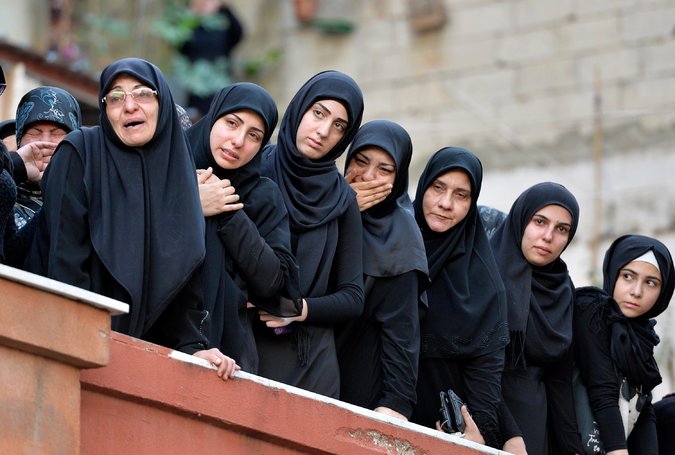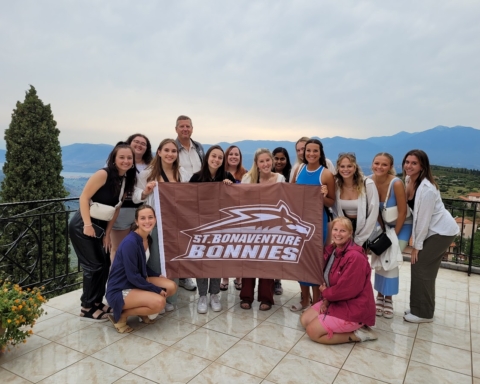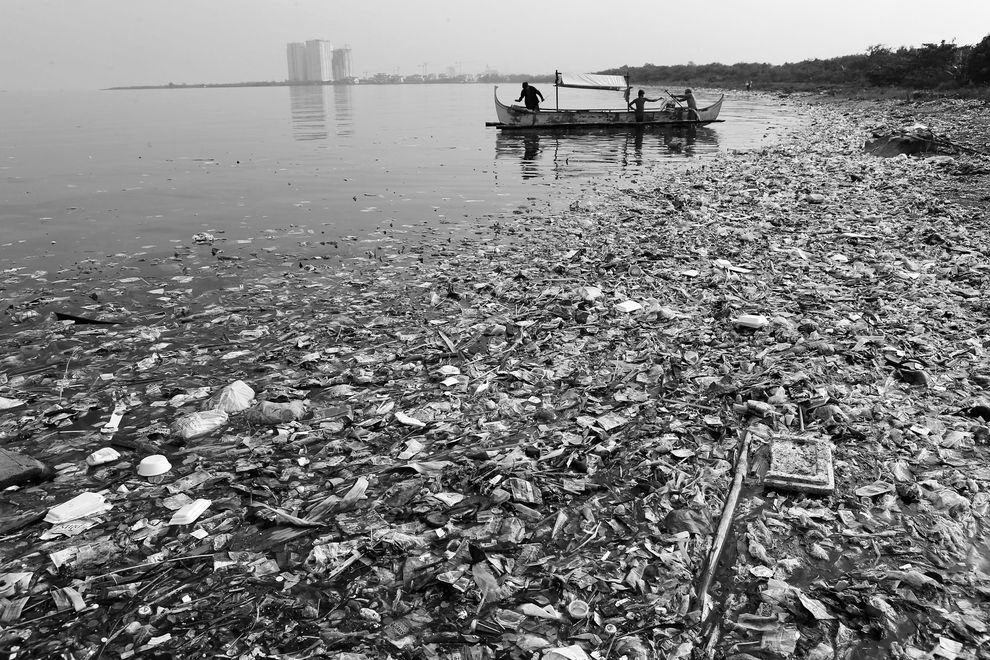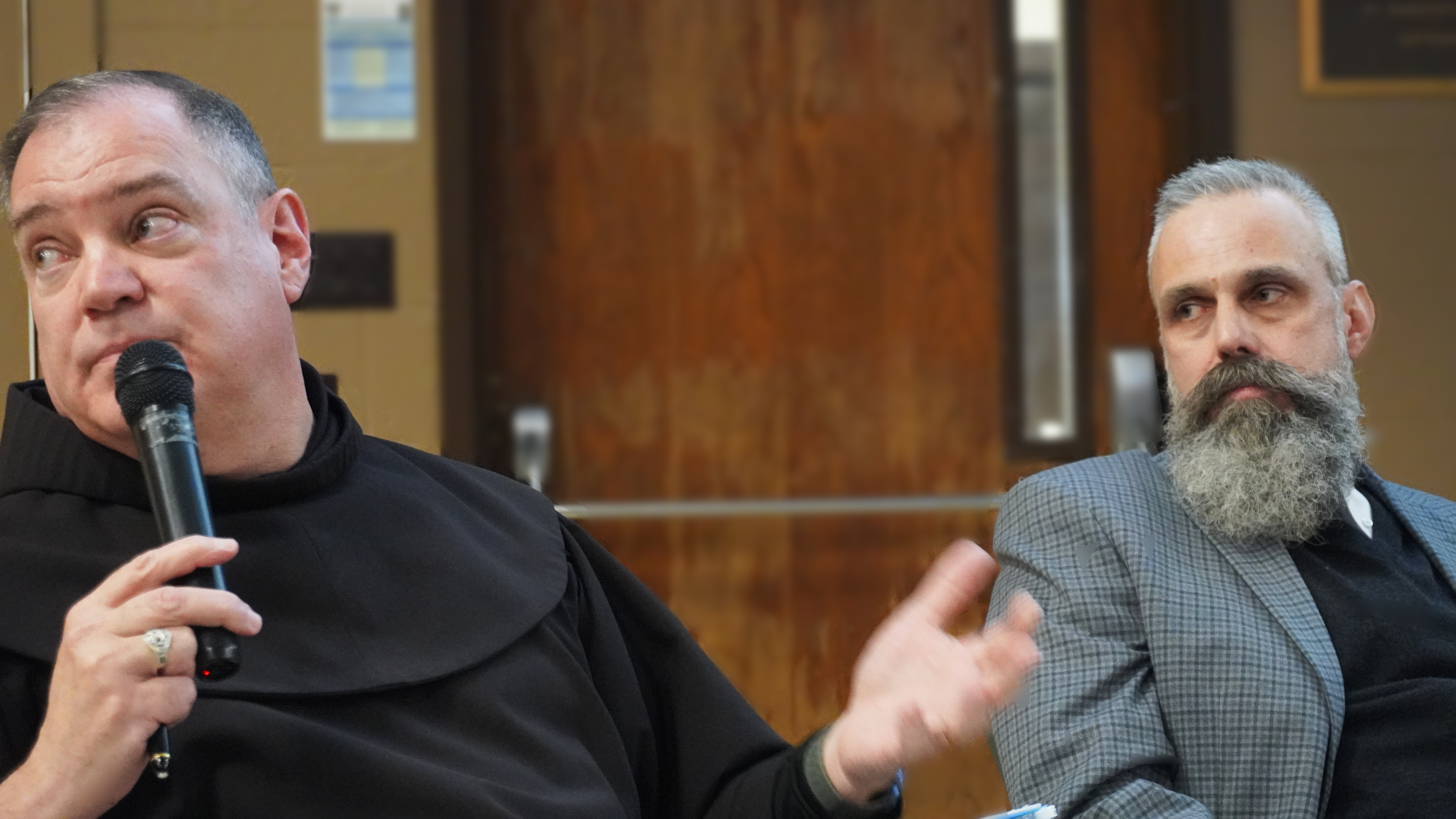By Julia Mericle and Rachel Konieczny
News Editor and News Assignment Editor
At a moment of reflection in response to the recent terrorist attacks on Paris and Beirut, Father Michael Calabria, O.F.M., director of the center for Arabic and Islamic studies at St. Bonaventure, told the audience that diversity is no accident.
“There is clearly much darkness in the world. The lies of racial, religious, ethnic and cultural superiority are spreading,” Father Calabria said. “You and I must stop them. Let us stop them with a message of unity in our diversity.”
Three explosions outside the Stade de France at 9:20 p.m. on Friday night marked the beginning of a night of terror in Paris, concluding with gunmen opening fire at a concert at Bataclan, according to The New York Times.
Gunmen also opened fire at a bar and several restaurants across the city. At least 129 were killed and more than 350 reported wounded.
Seven attackers died during the assaults on Paris and police raids have since brought several more suspects into custody and resulted in the death of Abdelhamid Abaaoud, a 27-year-old Belgian and alleged mastermind of the attacks. Manhunts are still underway for remaining suspect Salah Abdeslam, a 26-year-old Frenchman, according to The New York Times.
Islamic State militants claimed responsibility for the attacks, which President François Hollande declared “an act of war” against France, according to The New York Times.
In response, France bombed the Syrian city of Raqqa, the self-proclaimed Islamic State capital, with a series of airstrikes that began on Sunday night.
In a double suicide attack on Beirut, Lebanon, just one day earlier, 43 people were killed and at least 239 wounded. This attack was also attributed to the Islamic State, according to The New York Times.
“It would be a little simplistic to isolate Paris,” Jean-François Godet-Calogeras, professor of Franciscan studies, said. “There is something much broader that is going on.”
Ibrahim Zabad, professor of political science, said he thought France’s reaction was to satisfy the desire for revenge, but was not well considered.
Zabad questioned why western powers, including France, who displayed its ability to put together a fleet of planes to bomb the capital of ISIS in a very short amount of time, had not gone on the offensive earlier.
“[A better long-term strategy] would be to keep attacking ISIS non-stop,” Zabad said. “Never allow them to prosper and to flourish.”
Barry Gan, professor of philosophy, promoted a peaceful response instead.
“Every time there has been a terrorist attack, our response has been greater military force that has been only increasing and increasing and increasing and the result has been an increase in use of terrorist attacks against us,” Gan said.
According to Gan, the solution lies in stopping the use of military force in foreign countries.
“My recommendation is that the west take it on the chin for a generation or so without bombing people to smithereens in response,” Gan said. “I think we need to settle refugees. Make people feel better about the west. Help people feel better about themselves. Give them a sense of hope, and in a generation’s time we will see a slowing of terrorism. But we are only going to see an acceleration of it if we continue what we have been doing.”
Godet-Calogeras shared this sentiment; saying responding to hatred with hatred is a vicious cycle that ends in annihilation.
“It is absolutely horrible that human beings can treat other human beings in a way that animals do not treat other animals,” Godet-Calogeras said. “We can be the most cruel creatures in creation, but we can also be the most compassionate.”
In an effort to hinder the Islamic State’s production and exportation of oil, their primary source of funding for military operations, United States warplanes attacked hundreds of trucks being used to smuggle oil in Syria on Monday, according to The New York Times.
Officials said developments for the plan began prior to the recent attacks, but the United States hesitation stemmed from concern about causing civilian casualties. To avoid this, truck drivers were warned by leaflets dropped by warplanes to abandon their vehicles about an hour before the attacks.
Zabad said he believes the United States should ally with Russia, who has previously been bombing both Islamic State and the Assad Regime in Syria, commanded by President Bashar al-Assad.
According to Zabad, the strategic objective of the west is to undermine the Assad Regime and the lack of action against ISIS is in hopes that ISIS will help to achieve that goal.
“But how do they do that? They really have no other way except supporting, or let’s say, turning a blind eye, to those who are fighting Assad,” Zabad said. “It’s kind of ‘the enemy of your enemy is your friend.’ So, ISIS is the enemy of the Assad Regime, right? ISIS becomes our friend. And that is precisely why we know where they are, and we have not been bombing them.”
President Hollande has plans to meet President Barack Obama and Russian President Vladimir Putin to discuss the formation of a “larger coalition” to fight the Islamic State, according to The New York Times.
“Before you discuss if the U.S. should go to war against ISIS or any other future enemy, look around and remember that it will probably be one of your classmates filling those ‘boots on the ground,’” Noah Burton, junior political science and ROTC member, said.
Brother Kevin Kriso, O.F.M., urged America to reflect on itself.
“Oftentimes we try to make clear good guys and bad guys, but do we ask ourselves the question ‘How did it get this way?’ or ‘Could we have done something differently in the past that would not have set this system into motion?’” Brother Kevin said.
Godet-Calogeras agreed, saying there needs to be serious investigation and analysis of the roots of the problem, both inside and outside the Muslim world.
Durriya and Zahid Khairullah, both practicing Muslims and professors of business, agreed that the terrorists are not true Muslims because their actions are against the Qu’ran.
“In every religion in history some people want to misconstrue the scriptures for political or their own advancement or agenda,” Zahid Khairullah said.
These religious misconceptions present themselves in American society.
The United States is debating the decision of whether or not to accept Syrian refugees into the United States.
Robert Amico, professor of philosophy, said turning away people who have been properly vetted by the federal government is racist.
“They are fleeing from violence in their own country, and I think it would be a really big mistake not to trust the vetting process to weed out the people who might potentially be radical,” Amico said. “We don’t want to paint everybody with the same brush.”
Burton also warned against racism.
“If western nations treat Muslims like the enemy, ISIS will not have to send terrorists to our countries because we will have created our own,” Burton said.
Mary Rose Kubal, director of the international studies program, said the attacks in Paris have received much greater attention and media coverage than the similar attack in Beirut the day before or the terrorist attack on a Kenyan university last April.
According to Kubal, this is due to a mixture of Western bias and a lack of resources for the media.
“We don’t know that much, and what we do know about the Middle East is it seems to be a violent place. It seems to be a scary place,” Kubal said. “And so I think it fits into people’s stereotypes that [terrorist attacks] are just sort of normal.”
Kubal said that Americans are more likely to empathize with France, due to higher probability of relationship to the country.
“There is this ‘That could have been me.’ ‘That could have been New York City or that could have been me on my junior year abroad in Paris,’” Kubal said. “I don’t think people feel that ‘I could have been at a university in Kenya’.”
This sentiment prompted the SBU Hip Hop team to postpone a recent trip to New York City.
Emily Doherty, senior member of the hip-hop team, said team members understood and respected the decision to postpone the trip.
Jillian Jerard, senior modern language major, studied abroad in Aix-en-Provence, France, last semester. Jerard said she thinks it is a shame these terrorist attacks may prevent students from having the courage to study abroad.
“The worst thing citizens of the world can do after a terrorist attack is live in fear, because if we do that we let the terrorists win and we simply can not let them win,” Jerard said.
mericlje13@bonaventure.edu
koniecrc14@bonaventure.edu









